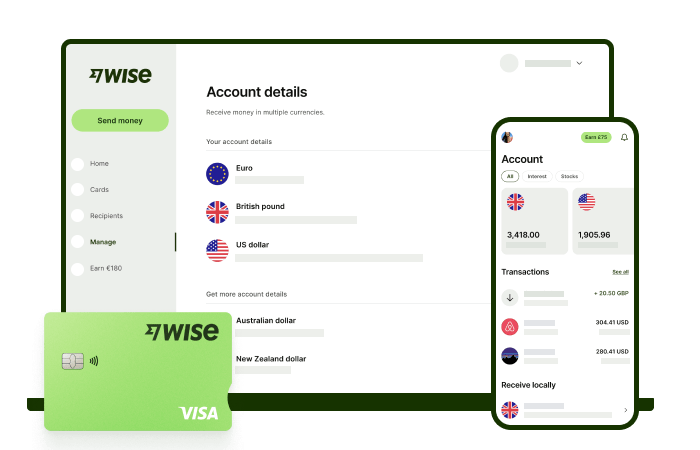
Moving to France from New Zealand: 2025 Relocation Guide for NZ
With an enviable climate, world class food, fine wine and a rich culture, there are plenty of reasons you may be considering moving to France from New Zealand. As well as opportunities for work, France is a great place to get immersed in a totally different culture while learning an important global language. So - if you’re thinking of relocating to France from New Zealand what do you need to sort out in advance?
This guide looks at the basics of immigrating to France from New Zealand, and highlights the Wise Account as a great way to manage your money as you move.
| Table of contents |
|---|
France Visa for New Zealand Residents
If you plan to stay in France long term, or if you will work or study while you’re there, you need to make sure you have your visa sorted out in advance of travel.
Visa applications for long term stays in France from New Zealand are processed by the French Consulate in Wellington1. It can take from 4 weeks to 3 months for the processing of an application for a long term visa for France. Be sure to apply with lots of time to spare.
There are plenty of different long term visa options for France, which are used for any stay of over 90 days. The best way to work out which one will suit your own unique needs is to use the French government’s Visa Wizard2. This online tool lets you enter your personal details and the purpose of your trip, to see the visas which may apply to you, including the fees and documents needed to support your application.
French Immigration Requirements
Different requirements will apply depending on the type of visa you decide to apply for. In any case as a New Zealand resident your application must be made in person at the French Embassy. You can make your appointment in advance online to make sure you’re seen on the day you select. Appointments are available on weekday mornings, through to 1:15 pm - no weekend options are offered.
Once you have an appointment you’ll need to gather all of your paperwork based on the visa you want to obtain, and take it along to your appointment. If you’re applying for a work visa after having been offered a position by a French employer, for example, you’ll usually need to apply with original copies of the following documents:
- Passport containing at least two blank pages
- Passport photos
- Proof of your employment in France
- Proof of accommodation in France
- Proof of funds
- Medical insurance for the first three months
When you submit your application you can ask the likely wait time and make arrangements to collect your passport upon approval.
Moving to France checklist
France offers lots to expats relocating, but as with any global move, you’ll need to be prepared well in advance to make sure everything runs smoothly. We’ll walk through some important things to think about before you leave and on arrival, to help you plan.
Before You Leave New Zealand
As we’ve already seen, any stay of over 90 days in France requires a visa - and your long stay visa may take some months to be processed. This means you need to get your application in early and move on to planning everything else once you’ve got your approval sorted out. Some important things to add to your checklist include:
- Find short term accommodation for immediately after your arrival in France based on your plans and budget
- Connect with expats already living in France online and through social media to build your network in advance
- Set a budget for your relocation - shipping household and personal goods is likely to be one of the more costly elements of your plan
- Arrange the practical aspects of your move including flights, shipping and familiarisation
- Check if you need to update any vaccinations before you travel
- Get health insurance to cover you on arrival
- You may decide to get an international driving license before you travel, depending on your intentions when you arrive
Upon Arrival in France
Once you’ve touched down in Paris your work really begins. Here are some things you may need to do:
- If your long term visa includes a requirement to get a residence permit you can sort this at the police headquarters in Paris, or at your municipal office if you’re going to be living in another city3
- Sort out your ongoing accommodation and practical considerations such as phone services, utilities, internet and so on
- Open a bank account or a multi-currency digital account which lets you manage EUR as well as NZD in one place
- Familiarise yourself with your local area including stores, restaurants, hospitals and other important local landmarks
How much money does it cost to move to France from NZ?
At an early stage, get quotes from relocation companies to cover the shipping you need to france. You might decide to take all your household goods - which is likely to mean having a full container to yourself. Or you may prefer to take only a few sentimental items in a partial container. Some really intrepid travellers leave home with just the bags they can take on a plane.
The costs of your relocation vary depending on how much you want to ship and whether you can wait to send things by ship only or if you need any air freight for urgent items. Getting several quotes from providers is the best way to decide on the right options for you. Other things to consider when budgeting include:
- Packing services if you choose to use them
- Flights and initial living expenses for you and your family
- Pet relocation if needed
- Accommodation on arrival and until you arrange permanent housing
Moving with Pets?
Learn more about the costs of pet relocation in our handy guide.
Cost of Living in France
In the Wise cost of living index, France ranks as the 15th most costly place to live. This is really quite similar to New Zealand which comes in at number 13.
The Wise cost of living index is a good rule of thumb, looking at the average cost of living in a location. However your costs day to day depend a lot on your accommodation choices and the types of things you like to do. Build your own budget thinking about how you want to spend your time when you’re in France, with a good margin for error to allow you to adjust as you settle in.
Get an idea of how the cost of living in France compares with New Zealand, in the Wise cost of living by country index.
Open a French bank account as a NZ Expat
Managing finances as an expat in France is easier when you have a local euro account. Get a guide on how to open a French bank account as a NZ expat, including a look at top banks for foreigners, in the Wise guide to the top banks in France.
You’re likely to find that you need to be able to send payments in euros conveniently even before you move. This may be needed for visa fees and paying rent in advance for example. One smart option is to open a Wise Account before you leave to hold, send, spend, receive and exchange EUR alongside NZD more conveniently and with the mid-market rate. In fact, in total Wise lets you hold over 40+ currencies, so your account could help you save all over the world.
Add money to your account in NZD and then order your Wise multi-currency debit card for spending and withdrawals at home and abroad. Wise uses the mid-market exchange rate for currency conversion with low, transparent fees, helping you to cut out high or unexpected foreign exchange fees.
Moving your Money to France from New Zealand
Once you’re in France, use a Wise card to spend and withdraw with transparent exchange fees and the mid-market rate.
You can add money to your account in NZD, and either convert to EUR in the Wise app, or let the card do it for you when you pay. In either case you get the same great rate and low fees. Spend like a local in France - and withdraw EUR from ATMs with low or no fees whenever you need to.
Moving your KiwiSaver Savings to France
While you can’t withdraw from your KiwiSaver savings until you’re 65 if you stay in New Zealand, this doesn’t necessarily apply if you’re planning to move to France permanently.
In this case you can withdraw your KiwiSaver savings and set up a local retirement fund in France instead. This process is managed through your KiwiSaver provider and can only be set in motion once you’ve actually emigrated.
Usually you need to complete the provider’s permanent emigration withdrawal form and submit a statutory declaration, signed by an authorized person, which confirms your permanent emigration from New Zealand. You’ll also be asked for evidence like your flight tickets or your passport.
Complete guide to withdrawing your Kiwisaver savings overseas 👉
Start your French journey with Wise
Open a Wise Account to hold a balance in EUR and make EUR payments even before you leave New Zealand. You can add funds in NZD easily, and then spend with your linked debit card. You’ll automatically get currency conversion at the mid-market rate and low, fair fees - and you're ready to tap to pay like a local when you land.
Plus Wise makes it easy to send money back home to New Zealand for those ongoing bills, and you can simply swipe your card for NZD spending when you go back home to visit.
| 🏠 Update your Wise Account after your move! |
|---|
| Once you have established your new home in France, remember to change the contact details on your Wise account. To comply with local and international law, Wise may need to verify your address again - and remember that new pricing and account features may apply when you convert a Wise account to be registered in another country: Learn about Wise pricing in France here. |
Your move to France is the start of a whole new chapter. It takes an enormous amount of planning to relocate internationally - but the rewards are huge. Use this guide to start thinking about how to set up your relocation - and grab a Wise Account before you leave, to make managing your money across currencies a breeze.
Sources:
*Please see terms of use and product availability for your region or visit Wise fees and pricing for the most up to date pricing and fee information.
This publication is provided for general information purposes and does not constitute legal, tax or other professional advice from Wise Payments Limited or its subsidiaries and its affiliates, and it is not intended as a substitute for obtaining advice from a financial advisor or any other professional.
We make no representations, warranties or guarantees, whether expressed or implied, that the content in the publication is accurate, complete or up to date.



